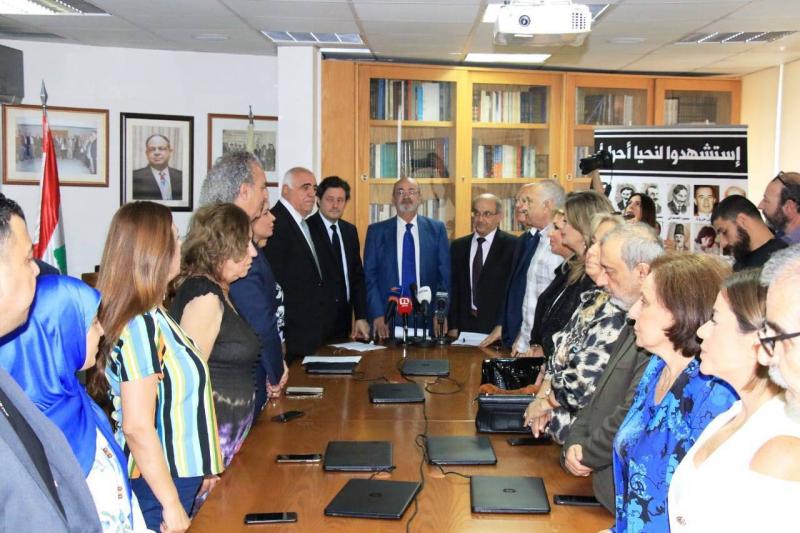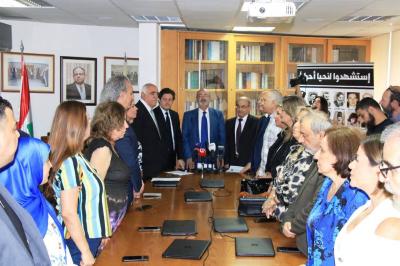The Lebanese Syndicate of Editors organized a seminar titled "The Crisis of Journalism and the Reality of Journalists" today, Wednesday, in memory of the martyrs of Lebanese journalism at its headquarters in Hazmieh. The seminar featured Minister of Information Ziad Makary and Minister of Youth and Sports George Clas, who spoke about the role of media colleges in keeping pace with the development of media means and the future of graduates. The seminar was moderated by Deputy Syndicate Chairman Salah Taqi Al-Din and attended by a host of fellow journalists, led by presidential advisor and director of media office at the presidential palace Rafiq Shalala.
The seminar began with a minute of silence in honor of the souls of the martyrs of journalism and the national anthem. Taqi Al-Din welcomed attendees, stating, "I welcome you to your home, the home of the Editors' Syndicate, which accommodates you despite its limitations, to discuss the challenges facing journalism and journalists."
"The crisis of Lebanese journalism and the reality of journalists has become a concern for those practicing this profession," he noted. "This crisis is related to the significant and dangerous development that occurred since major transformations in this sector, when television became capable of infiltrating homes and radio became a constant companion in cars and houses. However, audiovisual media now face a new reality with digital civilization and the invasion of electronic sites into the media space. In reality, journalism as a role and profession has not changed, but the means of media have changed. Naturally, print journalism was the first victim of this development. Periodically, we witness the closing of a newspaper or at least a decline in its capabilities, resources, and the provision of quality content and a decent living for its workers."
He added, "Based on this, we decided to organize this seminar to attempt to read the reality, indeed to read the crisis facing our sector, and to try with our esteemed guests to propose a vision for how to restore the sparkle to the profession of journalism, and how to address the situation of journalists, or at least to establish a framework that preserves their rights and future."
Taqi Al-Din highlighted the importance of ministers Ziad Makary and George Clas in discussing these challenges and underscoring the concerns of the profession. Minister Makary stated, "The crisis of journalism and the reality of journalists is a broad and complex title that is difficult for us to do justice to in a single session or speech or discussion. The crisis is deep, acute, and existential, and this is no secret to anyone, at least in recent years where no crisis dies without giving birth to a sister crisis. The reality of journalists reflects the crisis of their profession in a country facing crises on all levels and by all standards."
Makary pointed out that the journalism crisis is primarily financial, as the advertising market has severely declined, alongside a drop in newspaper and magazine sales following the digital and electronic explosion. He noted that, "The professional crisis we experience daily reflects how some journalism—though I don’t generalize here—tends to hurry and becomes hasty to the point of improvisation, dealing with many current issues perhaps in pursuit of ratings, the desire for journalistic scoop, or claims to uncover what has yet to be revealed, all at the expense of credibility, objectivity, and professional ethics."
He emphasized the historical price of truth that Lebanese journalists have paid with their blood over the past century, recalling notable martyrs from different periods, stating that "the Ministry of Information has not lagged in supporting journalists and pursuing their rights, nor will it spare any effort to defend their noble profession, whether through accompanying legislations that guarantee their rights or through thorough follow-ups on anything that may help them overcome the difficult circumstances imposed by financial, political, or administrative conditions."
Makary concluded by emphasizing that journalists need to bolster themselves and improve their performance to endure and overcome the crisis, affirming the Ministry of Information as a supportive ally. He also announced efforts to create a new media law that aligns with international standards, acknowledging that political divisions exist in Lebanon regarding sovereignty but stressing the need for a cohesive media framework to escape the prevailing chaos.
"We must not allow ourselves to lag behind in the age of social media," he declared, asserting that collective work is needed to achieve stability and security in Lebanese journalism.




